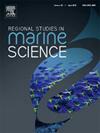Incorporating knowledge graph and multi-model stacking ensemble learning for prediction of fines for illegal fishing
IF 2.4
4区 环境科学与生态学
Q3 ECOLOGY
引用次数: 0
Abstract
Illegal fishing activities have a significant threat to global marine resource management, inflicting severe damage on marine ecosystems, disrupting legal fisheries economies, and hindering biodiversity conservation efforts. Research on Illegal, Unreported, and Unregulated (IUU) fishing activities have gained substantial attention globally, focusing on identification, monitoring, prevention, and policy formulation. However, limited efforts have been directed toward the prediction of fines and the assessment of legal repercussions. This gap hampers the timely accurate evaluation of the economic impacts of IUU fishing behaviors and undermines the full deterrent potential of legal penalties. Therefore, this paper proposes an integrated method combining knowledge graph and multi-model stacked generalization, aiming to enhance the accuracy of fines prediction for illegal fishing activities. Experimental results demonstrate that the proposed model significantly enhances prediction accuracy, interpretability, and stability compared with basic machine learning models, including eXtreme Gradient Boosting (XGBoost), Gradient Boosting Machines (GBM), K-Nearest Neighbor(K-NN), Categorical Boosting (CatBoost), and Random Forest(RF). This study provides a new technical guidance for the prediction of fines for illegal fishing activities, contributing significantly to enhancing the efficiency and effectiveness of fishery law enforcement.
结合知识图谱和多模型叠加集成学习的非法捕捞罚款预测
非法捕捞活动对全球海洋资源管理构成重大威胁,对海洋生态系统造成严重破坏,扰乱合法渔业经济,阻碍生物多样性保护工作。对非法、未报告和无管制(IUU)捕鱼活动的研究在全球范围内得到了广泛关注,重点是识别、监测、预防和政策制定。但是,在预测罚款和评估法律后果方面所作的努力有限。这一差距妨碍了及时准确地评估IUU捕鱼行为的经济影响,并破坏了法律处罚的充分威慑潜力。为此,本文提出了一种知识图与多模型叠加泛化相结合的综合方法,旨在提高非法捕捞活动罚款预测的准确性。实验结果表明,与基本的机器学习模型(包括eXtreme Gradient Boosting (XGBoost)、Gradient Boosting Machines (GBM)、K-Nearest Neighbor(K-NN)、Categorical Boosting (CatBoost)和Random Forest(RF))相比,该模型显著提高了预测精度、可解释性和稳定性。本研究为非法捕捞活动罚款预测提供了新的技术指导,对提高渔业执法效率和效果具有重要意义。
本文章由计算机程序翻译,如有差异,请以英文原文为准。
求助全文
约1分钟内获得全文
求助全文
来源期刊

Regional Studies in Marine Science
Agricultural and Biological Sciences-Ecology, Evolution, Behavior and Systematics
CiteScore
3.90
自引率
4.80%
发文量
336
审稿时长
69 days
期刊介绍:
REGIONAL STUDIES IN MARINE SCIENCE will publish scientifically sound papers on regional aspects of maritime and marine resources in estuaries, coastal zones, continental shelf, the seas and oceans.
 求助内容:
求助内容: 应助结果提醒方式:
应助结果提醒方式:


